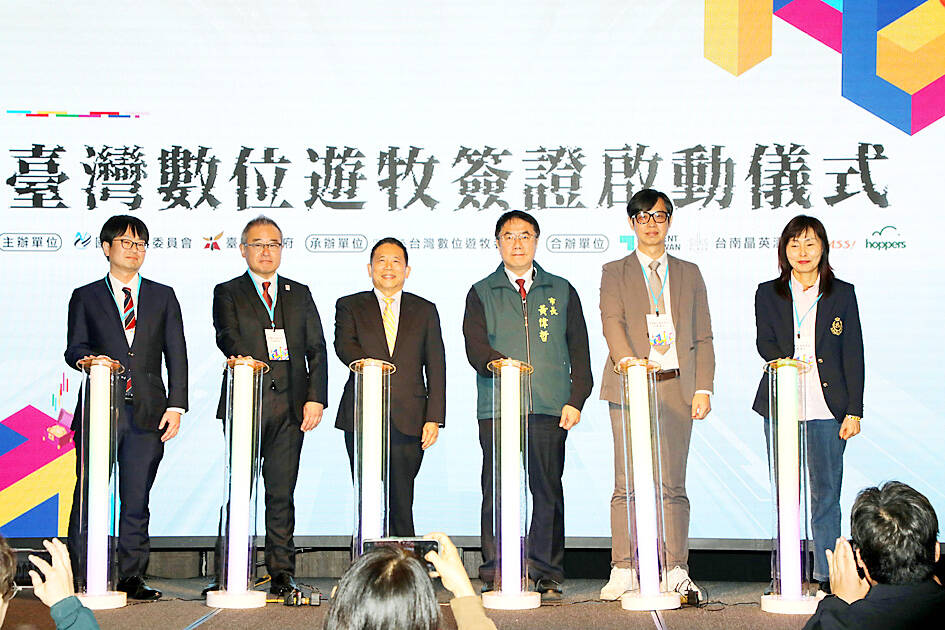Taiwan has launched a six-month “digital nomad visitor visa” program for foreign nationals from its list of visa-exempt countries who meet financial eligibility criteria and provide proof of work contracts.
To apply, foreign nationals must either provide proof that they have obtained a digital nomad visa issued by another country or demonstrate earnings based on age brackets, the Bureau of Consular Affairs said.
Applicants aged 20 to 29 must show they earned an annual salary of at least US$20,000 or its equivalent in one of the past two years, while those aged 30 or older must provide proof they earned US$40,000 in the same period.

Photo: CNA
Applicants must also provide “proof of bank deposits” averaging at least US$10,000 for the previous six-month period as well as “proof of health and full hospitalization insurance for the entire duration of stay,” the Ministry of Foreign Affairs said.
Only nationals from the ministry’s list of visa-exempt countries are eligible for the new visa, which includes citizens of Australia, Canada, Israel, Japan, New Zealand, South Korea, the UK, the US and several EU countries, including France and Germany.
Applicants must also provide a “personal resume or portfolio, including academic background and work experience,” a valid work contract from an employer or contracts for current freelance projects, and complete a “description of intended activities” form.
The new visa was launched on Wednesday last week by the National Development Council (NDC) in conjunction with the ministry, apparently in an attempt to attract financially independent foreign nationals to spend overseas-earned money in Taiwan.
The NDC in July last year said that it hoped to attract 100,000 “digital nomads” — referring to people who work remotely, sometimes for a company in one country while living in another.
However, nearly a week after applications were first opened, neither the NDC nor the ministry announced or promoted the new visa category on their Web sites in any language.
It is also unclear how the digital nomad visitor visa might differ practically from other visitor visas already offered to people from countries on the ministry’s visa-exemption list, except for offering a longer stay of up to six months.
Foreign nationals from the majority of Taiwan’s visa-exempt countries can already visit Taiwan for 90 days without providing proof of income, while British and Canadian nationals can extend their three-month stay to six months in total, the Bureau of Consular Affairs’ Web site says.

AGING: As of last month, people aged 65 or older accounted for 20.06 percent of the total population and the number of couples who got married fell by 18,685 from 2024 Taiwan has surpassed South Korea as the country least willing to have children, with an annual crude birthrate of 4.62 per 1,000 people, Ministry of the Interior data showed yesterday. The nation was previously ranked the second-lowest country in terms of total fertility rate, or the average number of children a woman has in her lifetime. However, South Korea’s fertility rate began to recover from 2023, with total fertility rate rising from 0.72 and estimated to reach 0.82 to 0.85 by last year, and the crude birthrate projected at 6.7 per 1,000 people. Japan’s crude birthrate was projected to fall below six,

US President Donald Trump in an interview with the New York Times published on Thursday said that “it’s up to” Chinese President Xi Jinping (習近平) what China does on Taiwan, but that he would be “very unhappy” with a change in the “status quo.” “He [Xi] considers it to be a part of China, and that’s up to him what he’s going to be doing, but I’ve expressed to him that I would be very unhappy if he did that, and I don’t think he’ll do that. I hope he doesn’t do that,” Trump said. Trump made the comments in the context

SELF-DEFENSE: Tokyo has accelerated its spending goal and its defense minister said the nation needs to discuss whether it should develop nuclear-powered submarines China is ramping up objections to what it sees as Japan’s desire to acquire nuclear weapons, despite Tokyo’s longstanding renunciation of such arms, deepening another fissure in the two neighbors’ increasingly tense ties. In what appears to be a concerted effort, China’s foreign and defense ministries issued statements on Thursday condemning alleged remilitarism efforts by Tokyo. The remarks came as two of the country’s top think tanks jointly issued a 29-page report framing actions by “right-wing forces” in Japan as posing a “serious threat” to world peace. While that report did not define “right-wing forces,” the Chinese Ministry of Foreign Affairs was

PREPAREDNESS: Given the difficulty of importing ammunition during wartime, the Ministry of National Defense said it would prioritize ‘coproduction’ partnerships A newly formed unit of the Marine Corps tasked with land-based security operations has recently replaced its aging, domestically produced rifles with more advanced, US-made M4A1 rifles, a source said yesterday. The unnamed source familiar with the matter said the First Security Battalion of the Marine Corps’ Air Defense and Base Guard Group has replaced its older T65K2 rifles, which have been in service since the late 1980s, with the newly received M4A1s. The source did not say exactly when the upgrade took place or how many M4A1s were issued to the battalion. The confirmation came after Chinese-language media reported